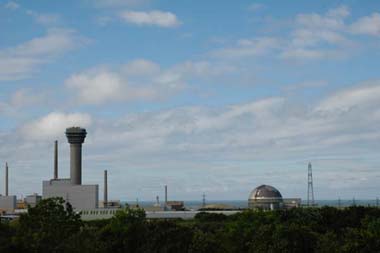
New Managing Director for Bellona Norway
The Board of the Bellona Foundation has appointed former Minister of Climate and the Environment Sveinung Rotevatn as Managing Director of Bellona No...
News

Publish date: August 4, 2005
Written by: Erik Martiniussen
News
In sharp contrast to established Swedish policy, Studsvik-SVAFO is now planing to send spent nuclear fuel to British plant Sellafield for reprocessing. The spent fuel originates from the first Swedish reactor, R1, which was in operated in Stockholm from 1954 to 1970.
The plans involve shipping a load of 4.7 tonnes of metallic uranium to Sellafield. The reprocessing will generate a total volume of 1600 litres of highly active waste, which will be shipped back to Sweden for final disposal. The fuel also contains 1.1 kilograms of plutonium, which will be converted into Mixed Oxide Fuel (MOX), and sent back to Sweden.
First load for 20 years
Even though the amounts of material involved are small, the plans are politically controversial. In the 1980s the Swedish government reversed its spent fuel policy of reprocessing in favour of direct disposal of its spent nuclear fuel. If the new plans materialise the spent fuel will be the first Swedish load to reach British shores in more than 20 years. The last year Swedish nuclear fuel was shipped to Britain for reprocessing was 1982.
If everything goes as Studsvik-SVAFO expects, the fuel will be shipped to Sellafield during the summer of 2007 and reprocessed in the 40-year-old Magnox reprocessing plant, also known as the B205-plant, at Sellafield. The Magnox reprocessing plant is the one of the two reprocessing plants at Sellafield that pollutes the most. There are plans to close it down in 2012.
Swedish authorities are expected to make a decision regarding the transport this August. At the moment, the fuel is being stored at the Swedish Studsvik research institute, near the town of Nyköping.
The Sellafield plant
Together with Norwegian authorities, Bellona has been working for several years to stop the controversial discharges of radioactive technetium-99 (Tc-99) from Sellafield, a nuclide with a half-life of 213,000 years. The work was crowned with success in April 2004 when the operator of the plant, British Nuclear Group (BNG), decided to start cleaning out the material from the discharges.
But even though Tc-99 now sucessfully being cleaned out, the plant is still polluting the Irish Sea with radioactive materials, such as small amounts of plutonium, Cesium-137 and Cobolt-60. These are all artificial and toxic radioactive isotopes with a rather long half-life. Most of the pollution descends from the Magnox reprocessing plant.
 Photo: Foto: Erik Martiniussen/ Bellona
Photo: Foto: Erik Martiniussen/ Bellona
In a letter to the Bellona Foundation the Swedish Nuclear Power Inspectorate (SKI) have written that it is no longer necessary to retrieve governmental permission to ship Swedish fuel to Sellafield.
Spent Nuclear fuels from Swedish nuclear power plants are currently stored at the central interim storage at the Oskarshamn nuclear power plant. Anyway the old fuel, from the R1 reactor, is such a type that it is more difficult to store, and deposit than ordinary fuel, made of uranium dioxide (UO2). The fuel is of a metallic form, very similar to British Magnox fuel, and corrodes easily in contact with water. Thats the reason why Studsvik-SVAFO has proposed to reprocess the fuel in Sellafield.
Norwegian protests
It exists though several alternative methods to treat the fuel. One alternative is to use a dry storage option, awaiting the development of a national treatment solution. Such alternatives have been considered by SKB International Consultants, but their report is being held back by the Swedish authorities as a Swedish business secret.
A letter from the Bellona Foundation informed the Norwegian government about the Swedish plan yesterday.
Norwegian Minister of the Environment, Knut Arild Hareide, told Norwegian press last night that he had strong objections against the Swedes shipping fuel to Sellafield, and said he would bring the case up with the Swedish Minister of the Environment.

The Board of the Bellona Foundation has appointed former Minister of Climate and the Environment Sveinung Rotevatn as Managing Director of Bellona No...

Økokrim, Norway’s authority for investigating and prosecuting economic and environmental crime, has imposed a record fine on Equinor following a comp...

Our op-ed originally appeared in The Moscow Times. For more than three decades, Russia has been burdened with the remains of the Soviet ...

The United Nation’s COP30 global climate negotiations in Belém, Brazil ended this weekend with a watered-down resolution that failed to halt deforest...